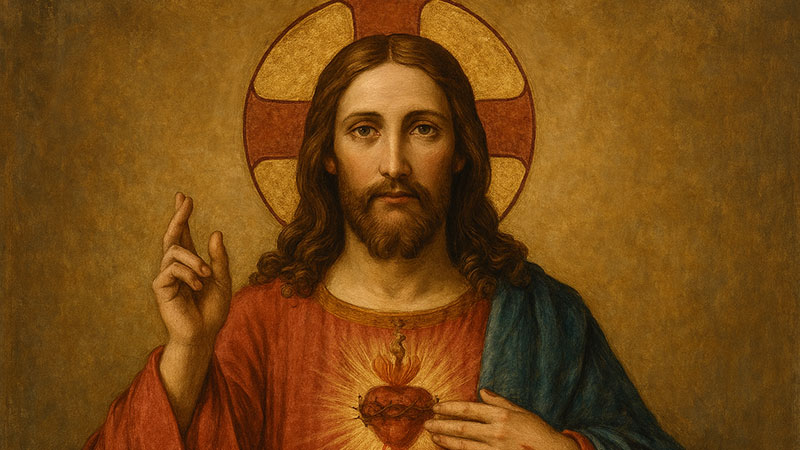For many, the concept of the Trinity can feel like a profound mystery. How can God be one, yet exist as three distinct persons: the Father, the Son (Jesus Christ), and the Holy Spirit? It’s a question that has fascinated believers and seekers for centuries.
At Peidayesh, we believe in salvation through the Lord Jesus Christ and that the only way for humanity to be saved is through faith in the living God, God the Son, and the Holy Spirit. This article will help you understand this foundational Christian belief, especially focusing on the vital role of Jesus Christ, the Son.
Imagine trying to fully grasp the vastness of the ocean or the intricate design of the universe. Some truths about God are so immense that they extend beyond our complete comprehension. Yet, God has revealed Himself to us in ways we can understand, inviting us into a relationship with Him.
The Trinity isn’t a puzzle to solve, but a beautiful revelation of God’s nature, a single, unified God existing in perfect, eternal communion as three distinct persons. Let’s embark on a journey to explore Jesus’ indispensable place within this divine mystery, drawing from the living Word of God, the Bible.
Read More: The Trinity: God the Father, the Son, and the Holy Spirit
The Unfolding Story of God
To understand Jesus’ role, we must first appreciate the grand narrative of God’s interaction with humanity, which the Bible reveals. From the very beginning, God has been at work, not as a solitary, distant figure, but as a relational being.
God in Creation: A Plurality Revealed
Even in the opening verses of Genesis, we get hints of God’s multi-personal nature. Genesis 1:26 states, “Then God said, ‘Let us make mankind in our image, in our likeness…'” Who is the “us” and “our” referring to? While primarily speaking of God’s majestic plurality, Christian tradition understands this as an early glimpse of the Father, Son, and Holy Spirit working in concert.
Colossians 1:16 confirms Jesus’ active participation in creation: “For in him all things were created: things in heaven and on earth, visible and invisible, whether thrones or powers or rulers or authorities; all things have been created through him and for him.” Jesus wasn’t just an observer; He was actively involved in bringing the cosmos into being.
He is the Word through whom all things were made, as John 1:3 declares: “Through him all things were made; without him nothing was made that has been made.”
The Old Testament’s Whispers of the Son
While the Old Testament primarily emphasizes God’s oneness, it also contains prophetic whispers and foreshadowings of a coming Messiah, a divine figure who would play a crucial role in God’s plan. Think of Psalm 110:1, where David writes, “The Lord says to my Lord: ‘Sit at my right hand until I make your enemies a footstool for your feet.'”
Jesus Himself later quoted this verse, identifying “my Lord” as the Messiah (Matthew 22:44). The prophet Isaiah, hundreds of years before Jesus’ birth, spoke of a child who would be born, a Son given, whose name would include “Mighty God, Everlasting Father, Prince of Peace” (Isaiah 9:6).
These passages, among many others, laid the groundwork, preparing God’s people for the arrival of the one who would truly reveal God in His fullness.

Jesus Enters the Story: God Incarnate
The most astonishing part of God’s story is when the eternal Son of God stepped into human history. This is the Incarnation, God becoming flesh.
The Word Became Flesh
John 1:14 famously states, “The Word became flesh and made his dwelling among us. We have seen his glory, the glory of the one and only Son, who came from the Father, full of grace and truth.” This “Word” is Jesus.
He didn’t just represent God; He is God. This means that when Jesus walked on earth, people were not merely seeing a prophet or a wise teacher; they were seeing God Himself, veiled in humanity. This profound truth is central to understanding Jesus’ role in the Trinity. He is the perfect bridge between the divine and the human.
Fully God and Fully Human
This is a critical aspect of Jesus’ identity. He was fully God, possessing all the attributes of deity: omnipotence (all-powerful), omniscience (all-knowing), omnipresence (present everywhere), and eternality. He performed miracles, forgave sins (something only God can do), and accepted worship.
Yet, He was also fully human, experiencing hunger, thirst, joy, sorrow, and temptation, just like us. Hebrews 4:15 says, “For we do not have a high priest who is unable to empathize with our weaknesses, but we have one who has been tempted in every way, just as we are, yet he did not sin.”
This dual nature wasn’t a fifty-fifty split; He was 100% God and 100% human, a mystery that allows Him to fully understand both God’s nature and human experience.
Read More: The Holy Spirit’s Role in the Trinity: Bible Insights
Jesus’ Unique Role in the Trinity
Now, let’s dive deeper into the specific functions Jesus fulfills within the dynamic relationship of the Trinity.
The Revealer of the Father
Before Jesus, humanity had glimpses of God, but often through laws, prophets, and mighty acts. Jesus, however, provided the clearest, most direct revelation of who God truly is. He said in John 14:9, “Anyone who has seen me has seen the Father.”
He didn’t just talk about God; He embodied God’s character, love, justice, and mercy. Through Jesus’ life, teachings, and actions, we see the Father’s heart for humanity. He showed us that God is not a distant, wrathful deity, but a loving Father who longs for a relationship with His children.
The Mediator Between God and Humanity
Because Jesus is both fully God and fully human, He is uniquely qualified to be our Mediator. As 1 Timothy 2:5 states, “For there is one God and one mediator between God and mankind, the man Christ Jesus.” Humanity, separated from God by sin, needed someone to bridge that gap.
Jesus, being God, understood God’s righteous demands. Being human, He understood our limitations and struggles. He became the perfect go-between, representing us to God and representing God to us. His mediatorial role is crucial for our salvation.
The Redeemer: His Sacrificial Work
The core of Jesus’ role in the Trinity, and indeed in salvation, is His work on the cross. This is where His divine nature and human experience perfectly converged for our benefit. As the spotless Lamb of God, He offered Himself as the ultimate sacrifice for the sins of humanity. Romans 5:8 declares, “But God demonstrates his love for us in this: While we were still sinners, Christ died for us.”
Think of it like this: humanity had accumulated an insurmountable debt of sin, a debt we could never repay. Because God is just, sin had to be dealt with. But because God is also loving, He provided a way.
Jesus, the sinless Son of God, took our place. His death was not a defeat, but a triumphant act of love and obedience to the Father’s will. By shedding His blood, He paid the penalty for our sins, once and for all. This is the essence of redemption: He bought us back from the slavery of sin.
But the story doesn’t end with the cross! Three days later, Jesus rose from the dead, conquering sin and death. This resurrection proves His divine power and validates His claim to be the Son of God. It is through His death and resurrection that we find true salvation, a new life free from the power of sin and the fear of death.
As Romans 10:9 states, “If you declare with your mouth, ‘Jesus is Lord,’ and believe in your heart that God raised him from the dead, you will be saved.” This belief in the living God, God the Son, is the only path to salvation.

The Giver of the Holy Spirit
After His resurrection and before His ascension, Jesus promised to send the Holy Spirit (John 14: 16 –17, 26). This promise reveals the close relationship within the Trinity. The Holy Spirit, the third person of the Trinity, is sent by both the Father and the Son. He comes to live among believers, empowers them for service, guides them into truth, and convicts the world of sin and righteousness.
Jesus’ ascension to the Father’s right hand made way for the Spirit’s outpouring. This shows the continuous and united work of the Godhead in our lives.
Why is Jesus’ Role in the Trinity So Central?
Understanding Jesus’ role within the Trinity isn’t just about theological accuracy; it has profound implications for our faith and our lives.
Our Access to God
Because Jesus is God, and He took on human form, He makes God approachable. We don’t have to guess what God is like; we look to Jesus. He is the way, the truth, and the life (John 14:6), and “no one comes to the Father except through me.” His distinct yet unified role with the Father and the Spirit ensures our direct access to God.
Read More: What the Bible Says About Baptism
The Foundation of Our Salvation
Our salvation is entirely dependent on Jesus’ unique identity and work. If Jesus were merely a good man, a prophet, or an angel, His sacrifice would not have been sufficient to atone for the sins of the world. Only God could pay the infinite price for infinite sin.
His being fully God enabled Him to conquer sin and death, and His being fully human enabled Him to represent us perfectly. We emphasize that this salvation is a gift received through faith in the living God, God the Son, and the Holy Spirit.
The Pattern for Our Lives
Jesus’ life on earth provides the ultimate example of how to live in obedience to God, how to love others, and how to serve. His surrender to the Father’s will, even unto death, is a powerful model for all believers. As we seek to follow Christ, we are transformed into His likeness, a process guided by the Holy Spirit.
Conclusion
The Trinity, while mysterious, reveals a God who is inherently relational, dynamic, and actively involved in His creation and our lives. Jesus Christ, the eternal Son, is not a lesser deity or a created being; He is God, coequal and co-eternal with the Father and the Holy Spirit.
His distinct role within the Godhead, as the Revealer, Mediator, and Redeemer, is indispensable to Christian faith and salvation. He came to reveal the Father, to bridge the gap between God and humanity through His sacrificial death and resurrection, and to send the Holy Spirit to empower us.
His unique position ensures that we, as believers, have full access to God and a sure hope of eternal life. Through Him, we understand the boundless love of God and the ultimate path to true freedom and salvation.
At Peidayesh, we continue to share this good news: that salvation is found only through faith in the living God, Jesus Christ, the Son, and the Holy Spirit.
FAQ
He was actively involved in creation, and all things were created through Him and for Him.
The Incarnation refers to the truth that the eternal Son of God, Jesus Christ, became flesh, being both fully God and fully human.
Because through His death, He paid the penalty for humanity’s sins, and through His resurrection, He conquered the power of sin and death.









Add comment